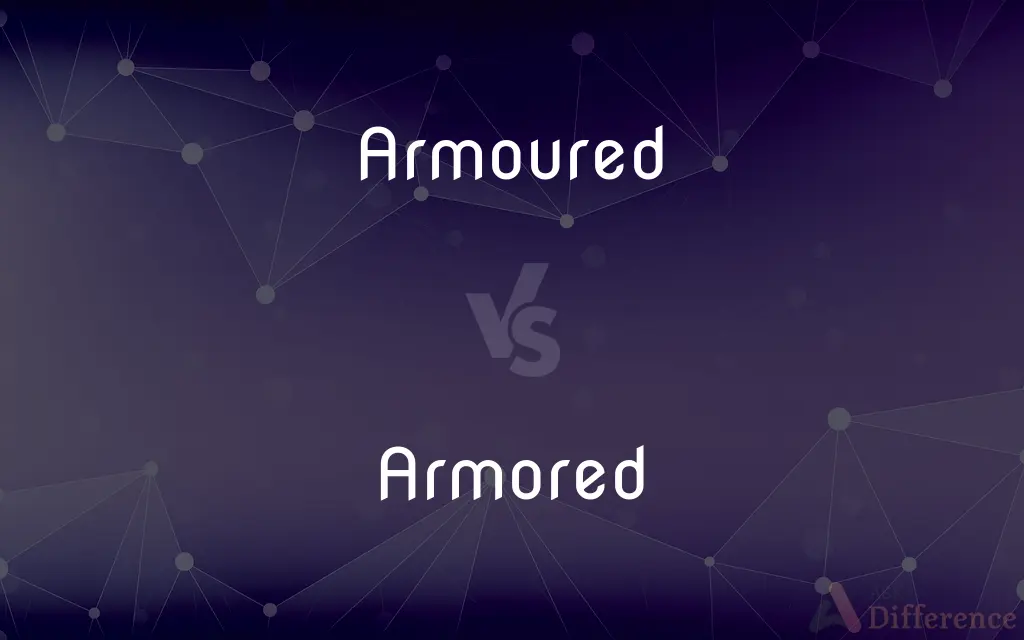Armoured vs. Armored — What's the Difference?
By Maham Liaqat & Fiza Rafique — Updated on April 7, 2024
Armoured emphasizes British English spelling with an extra 'u,' whereas Armored adheres to American English conventions.

Difference Between Armoured and Armored
Table of Contents
ADVERTISEMENT
Key Differences
Armoured is the spelling used in British English, reflecting the UK's convention of adding 'u' to certain words, which enriches the language's history and connection to French and Latin origins. On the other hand, Armored is preferred in American English, which tends to simplify spellings by omitting the 'u,' illustrating a linguistic evolution aimed at phonetic simplicity and efficiency.
While Armoured might appear in contexts related to British literature, historical texts, or in countries following British English standards, Armored is predominantly seen in American publications, media, and academic writings, highlighting a transatlantic divide in English language usage.
The choice between Armoured and Armored can also signify the writer's cultural identity or the intended audience's linguistic preference, with Armoured often invoking a more traditional or international flavor, whereas Armored is seen as modern and specifically American.
In technical or specialized fields such as military history or vehicle manufacturing, the spelling might align with the country of origin or the primary market, thus Armoured could be used in British defense publications, while Armored is used in American contexts.
Despite these differences, it's important to note that both terms refer to the same concept of being protected by armor, whether discussing military vehicles, protective clothing, or fortified structures, demonstrating how spelling variations do not alter the fundamental meaning.
ADVERTISEMENT
Comparison Chart
Spelling
British English, includes 'u'
American English, excludes 'u'
Usage
Preferred in the UK and Commonwealth countries
Preferred in the United States
Publications
Appears in British literature and official documents
Found in American media and academic texts
Cultural Identity
Often reflects a traditional or international approach
Indicates a modern, American preference
Context
Used in discussions related to British or international English standards
Used when referring to American English conventions
Compare with Definitions
Armoured
Equipped with armor for protection.
Medieval knights were heavily armoured for battle.
Armored
Covered with or protected by armor.
The armored division advanced under the cover of night.
Armoured
Covered with or protected by armor.
The armoured vehicle was deployed for reconnaissance missions.
Armored
Having a protective covering.
Armored gloves are essential for handling dangerous materials.
Armoured
Having a protective covering.
The armoured cable ensures safety in hazardous environments.
Armored
Made strong and secure.
The safe was armored to resist drilling and cutting.
Armoured
Made strong and secure.
The bunker was armoured against any form of attack.
Armored
Equipped with armor for protection.
The soldiers were armored against enemy fire.
Armoured
Referring to troops equipped with armored vehicles.
The armoured brigade was stationed at the border.
Armored
Referring to troops equipped with armored vehicles.
An armored unit was deployed for the mission.
Armoured
Variant of armor.
Armored
A defensive covering, as of metal, leather, or synthetic materials, worn to protect the body against weapons.
Armoured
Simple past tense and past participle of armour
Armored
A tough, protective covering, such as the bony scales covering certain animals or the metallic plates on tanks or warships.
Armoured
Possessing, wearing, or fitted out with armour.
The armoured vehicles rolled into the city.
Armored
A safeguard or protection
Faith, the missionary's armor.
Armoured
(military) Equipped with armoured vehicles.
An armoured unit; the Royal Canadian Armoured Corps
Armored
The combat arm that deploys armored vehicles, such as tanks.
Armoured
Provided with protective covering; - used of animals. Opposite of unarmored.
Armored
The armored vehicles of an army.
Armoured
Same as armor-clad; - used of persons or things military. Opposite of unarmored.
Armored
To cover with armor.
Armoured
Used of animals; provided with protective covering
Armored
Clad or equipped with arms or armor.
Armoured
Protected by armor (used of persons or things military)
Armored
Covered with armor, as a ship or the face of a fortification; armor-plated.
Armored
Simple past tense and past participle of armor
Armored
Clad with armor.
Armored
Protected by armor (used of persons or things military)
Armored
Used of animals; provided with protective covering
Armored
Equipped with the complete arms and armor of a warrior
Common Curiosities
Is there any difference in pronunciation between armoured and armored?
The pronunciation is generally the same, though slight regional variations may exist.
Is "armoured" only used in military contexts?
No, it can also refer to anything that is protected or strengthened, not just military equipment.
Do armoured vehicles differ from armored vehicles in design?
No, the design and function are the same; the difference is purely in spelling.
Can both "armoured" and "armored" be used interchangeably?
Yes, they can be used interchangeably, depending on the audience's linguistic preference.
What is the main difference between armoured and armored?
The main difference is spelling: "armoured" is British English, while "armored" is American English.
Can the choice of spelling impact the perception of a text?
Yes, it can signal the writer's cultural background or the intended audience's language standard.
In which countries is "armoured" the preferred spelling?
It is preferred in the UK, Canada, Australia, and other countries using British English standards.
Why does American English prefer "armored" over "armoured"?
American English tends to simplify spellings, and "armored" reflects this by omitting the "u".
What type of protection does "armoured" or "armored" imply?
It implies protection against physical damage, typically by metal or similar hard materials.
Are there other words that follow the same spelling variation as armoured and armored?
Yes, words like "colour/color" and "favour/favor" follow a similar pattern.
Can the spelling variation affect search engine results?
Yes, searching for one spelling over the other might yield results more relevant to either British or American contexts.
Can an individual be described as "armoured"?
Yes, in a figurative sense, referring to someone's emotional or mental resilience.
Does the use of "armoured" in literature have a different connotation than "armored"?
The connotation is generally the same, though "armoured" may evoke a more traditional or British tone.
Are there specific industries where one spelling is more common?
Yes, defense industries and publications in British English-speaking countries prefer "armoured," while their American counterparts use "armored."
Is one spelling considered more correct than the other?
Neither spelling is more correct; it depends on the language standard being followed.
Share Your Discovery

Previous Comparison
Analysis vs. Conclusion
Next Comparison
Dismember vs. RememberAuthor Spotlight
Written by
Maham LiaqatCo-written by
Fiza RafiqueFiza Rafique is a skilled content writer at AskDifference.com, where she meticulously refines and enhances written pieces. Drawing from her vast editorial expertise, Fiza ensures clarity, accuracy, and precision in every article. Passionate about language, she continually seeks to elevate the quality of content for readers worldwide.
















































